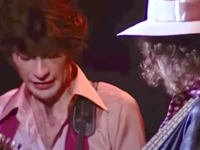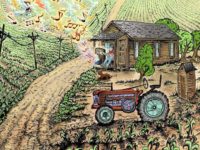The on-screen stars of The Last Waltz, simply galvanizing throughout, are Rick Danko and Robbie Robertson. They come off in Martin Scorsese’s bittersweet 1978 film, conceived as the Band’s concert farewell on Thanksgiving night at San Francisco’s Winterland, like rock ‘n’ roll updates of Johnny Boy and Charlie from Mean Streets.
Meanwhile, Bob Dylan almost didn’t go on — and Levon Helm made his enduring dissatisfaction with the whole production abundantly clear in his 1993 memoir This Wheel’s On Fire. And yet, the latter two ended up providing the all-star The Last Waltz with its heart and soul.
Helm’s voice is the concert’s conscience (by turns bawdy, guttural and sincere), while his playing is its life blood. Nobody sounds more in the moment, more viscerally involved — likely because, as Band producer John Simon tells us, his was the only performance unaltered by post-production overdubs.
Dylan, on the other hand, was expected for rehearsals at Shangi-La, but never appeared. (Joni Mitchell on the other hand did, but couldn’t explain her own songs’ unusual tunings; Garth Hudson stepped in to help.) When Dylan finally showed, he locked himself away at Miyako’s piano-lounge basement. The Band did a couple of run throughs there, but without ever getting confirmation on his participation in the film.
Somehow, you can trace none of that indecision in the nervy, if far too brief, moments he was on stage in San Francisco. He and the Band reconnected with the startling, genre-rattling energy that hurtled them both to previously unimagined places as the 1960s waned. Dylan pushed back, and hard.
The Band went first, running through two hours of their best-known hits, from “Up on Cripple Creek” to “This Wheel’s On Fire,” “The Shape I’m In” to “Life is a Carnival,” “Rag Mama Rag” to “Stage Fright,” even as dinner was served. (Promoter Bill Graham conceived of the concert as a Thanksgiving event, with a huge meal — they served 220 turkeys and 500 pounds of cranberry sauce — included in the price.) Things were just getting started. “I was on stage for five and a half hours,” Danko told Dirty Linen in 1992. “They could do a Son of ‘The Last Waltz,’ because we’ve got some great material. We only used a small amount of it.”
Dylan arrived during the Band’s set, retreating to a dressing room. Negotiations on his participation continued through the intermission, apparently hung on the idea that The Last Waltz would be competing with Dylan’s own film project, Renaldo and Clara. The problem was, Warner Bros. had funded Scorsese’s movie with an understanding that Bob Dylan would appear. Finally, after another round of discussions, Dylan agreed to let crews film his last two songs, starting with a bitterly ironic run through “Forever Young,” which Dylan cuffs around with an acid brusqueness, curtly denying the evening’s embedded nostalgia.
Together, Dylan and the Band resurrected two lesser-known gems from their infamous 1966 electric tour, “I Don’t Believe You (She Acts like We Never Have Met)” and — in a twist, Helm once said — “Baby, Let Me Follow You Down.” “Surprised, we played along — figuring that Bob realized we were missing something good by not having any of the old rock ‘n’ roll on film,” Helm wrote in This Wheel’s On Fire.
Dylan and the Band tore into them like hungry wolves — to the point where Dylan nearly snarls himself hoarse. As the crews tried to wrap up at the agreed-upon time, Helm said Bill Graham rushed in to countermand those instructions, saying “Fuck you! Roll the fucking cameras! Roll ’em!” And thus, the raucous and celebratory sing-along of “I Shall Be Released” made it into The Last Waltz.
Not that the film, and its companion album, don’t shine a spotlight on the contributions of others. Van Morrison provides a needed spark during the lengthy concert’s mid point, Muddy Waters simply roars through a late-period rendition of “Mannish Boy,” EmmyLou Harris imbues “Evangeline” with a crystalline beauty, and Danko’s darkly emotional “It Makes No Difference” arguably outdoes the original studio version. Robertson, performing with an unfettered joy, fires off volley after volley of stiletto-precise guitar work, while Hudson creates a spectral frame for it all.
Of the Band, only Richard Manuel seems to recede in the moment. Not every guest works, including an out-of-place Neil Diamond and a simply out-of-it Neil Young. That anyone’s star shone so brightly, in retrospect, is no small miracle. Last-minute planning snafus — not least of which was Dylan’s unwillingness to commit — and recording mishaps nearly derailed The Last Waltz time and time again. Ultimately, the Band rehearsed for a staggering 12 hours, trying to nail down the arrangements and sound requirements for this bulging multi-artist extravaganza. Each of the songs would be performed live, in front of a sold-out crowd, and a huge crew with recording equipment.
“I mean, we had to learn twenty-some-odd songs we’d never played before in our lives,” Robertson told Musician in 1982. “So, every time out of the chute it was like throwing the dice. It’s hard enough to remember our own stuff, let alone everybody from Joni Mitchell to Muddy Waters.”
That actually played right into the hands of Dylan and Helm, two performers born to the stage. Helm was always most at home there; Dylan still is.
If Danko nearly bested a signature performance from his own studio career, Levon Helm did one better — constructing the definitive version of “The Night They Drove Old Dixie Down” with the addition of a coiled horn section. His brilliant pairing with the Staple Singers for an update of “The Weight” plumbed undiscovered depths of meaning. He breathes shuddering new life into “Mystery Train,” and snorts through “Ophelia” with a salacious grit — the latter of which ends with a triumphal Helm sighing with what looks like satisfied exhaustion. Dylan, meanwhile, managed that rarest of things — recapturing the danger and meaning of his best years, no small thing.
That Thanksgiving evening, 38 years gone, concluded in the only way it could, really. Helm wanders back out on stage, leading a loose jam for about 30 minutes before the rest of his Band mates eventually return, as well. That leads to the five-man lineup’s last song performance, an ironic run through the desperate pleas of “Don’t Do It” that ended around 2 a.m. “When it was over,” Helm said, “so was the Band.” Robertson stepped up to the microphone and said, “Thank you, goodnight.” And then: “Goodbye.”
- How Deep Cuts on ‘Music From Big Pink’ Underscore the Band’s Triumph - July 31, 2023
- How ‘Islands’ Signaled the Sad End of the Band’s Five-Man Edition - March 15, 2022
- The Band’s ‘Christmas Must Be Tonight’ Remains an Unjustly Overlooked Holiday Classic - December 25, 2016




